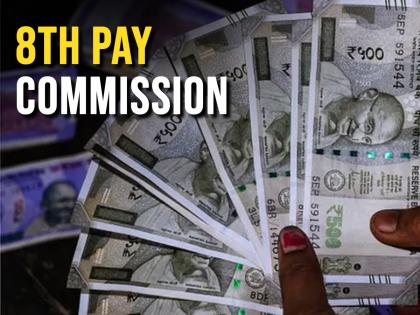8th Pay Commission: Employee Unions Demand 2.86 Fitment Factor; Will Salaries See a Real Hike This Time?
By Lokmat English Desk | Updated: May 13, 2025 21:57 IST2025-05-13T21:53:59+5:302025-05-13T21:57:09+5:30
The Central Government announced the formation of the 8th Pay Commission in January 2024. This decision by the central government ...

8th Pay Commission: Employee Unions Demand 2.86 Fitment Factor; Will Salaries See a Real Hike This Time?
The Central Government announced the formation of the 8th Pay Commission in January 2024. This decision by the central government will benefit approximately 1.2 crore (12 million) central government employees and pensioners. Discussions are underway among employees and pensioners regarding the structure of the 8th Pay Commission and the possible salary hike. These discussions focus on what the fitment factor will be and how much the salary might increase.
What is the Fitment Factor?
The fitment factor is a multiplier used to calculate the new basic salary under the new pay commission.
For example, if an employee’s current basic pay is ₹18,000 and the fitment factor is 2.86, then the new basic salary becomes ₹51,480. However, although this figure seems large, the actual benefit may not be as significant.
What happened in the last pay commission?
In the 6th Pay Commission (2006), the fitment factor was 1.86, which led to a 54% salary increase.
In the 7th Pay Commission (2016), the fitment factor was 2.57, but the salary increase was only 14.2%. The main reason for this was that the fitment factor was largely used to adjust for inflation (dearness allowance), rather than providing a real hike.
What could happen this time?
Various employee unions are demanding a fitment factor of 2.86 in the 8th Pay Commission, which could lead to a genuine increase in salaries and pensions. However, according to a report by the Financial Express, former Finance Secretary Subhash Garg believes such a large increase is unlikely. He suggests that the fitment factor could be set at 1.92, which would raise the minimum basic salary to ₹34,560.
Experts also say that a significant portion of the fitment factor could again be used to adjust inflation, limiting the real benefit.
How much did salaries increase in the 7th Pay Commission?
In the 7th Pay Commission, a 125% dearness allowance was merged into the salary. Within the 2.57 fitment factor, only 0.32 was considered as a new increase. This means that out of the total revision, only 14.2% was a genuine gain—the rest was just a restructured version of existing payments.
Also Read: Body of BJP leader Dilip Ghosh's son recovered from his Kolkata residence
What is the current status?
The government recently issued two circulars initiating the process of appointing personnel to 40 positions under the 8th Pay Commission. Officers from various departments are being appointed on deputation. The Terms of Reference for the commission will soon be issued, after which the Chairman and other members will be appointed.
The recommendations of the 8th Pay Commission will be implemented from 1 January 2026. The 7th Pay Commission's term will end on 31 December 2025. During the 7th Pay Commission, the government bore an additional financial burden of ₹1.02 lakh crore. In the 8th Pay Commission, the higher the fitment factor, the greater the financial burden could be. Hence, the government is taking measured steps this time.
Open in app